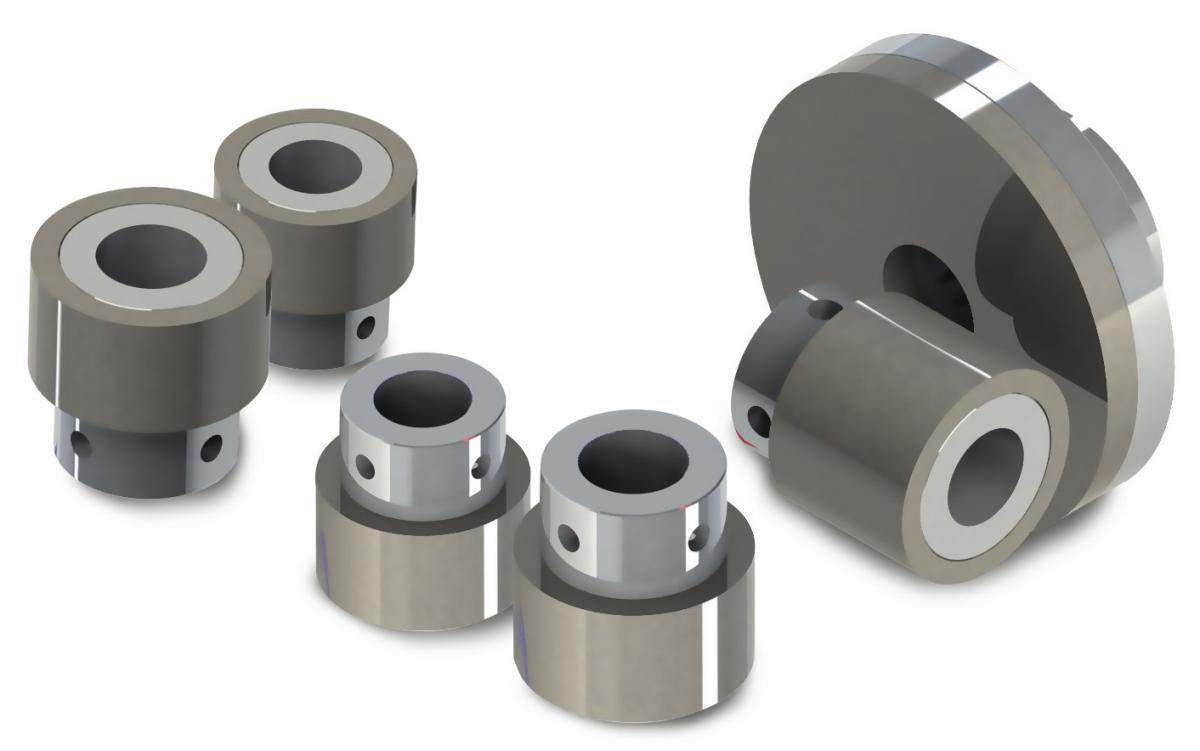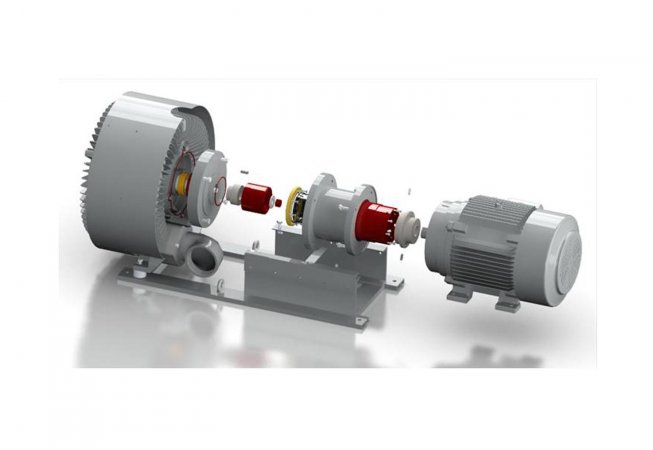Product Description
Made in China custom Magnetic Coupling with High Quality
Introducing our custom Magnetic Coupling, proudly made in China with the highest quality standards. This coupling is designed to provide exceptional performance and reliability, making it an ideal choice for various applications.
Our Magnetic Coupling is crafted using rare earth magnets, ensuring a strong and durable connection. It offers a secure and efficient transfer of power between shafts, eliminating the need for physical contact. This feature not only reduces wear and tear but also minimizes the risk of contamination, making it suitable for sensitive environments.
Ordinary magnetic coupling, working temperature less than 80 ºC, without acid or alkali corrosion environment. Please contact customer service for customization.
| NO. | ФA | ФB | C | ФD | Фa | Фb | Фd | E | F | H | J | K | L | M | P | S | T | V | Фh | Фx | torqueN.m |
| YCL045 | 45 | 38 | 50 | 19 | 33 | 27 | 12 | 32 | 6 | 38 | 5 | 4 | 60 | 4 | 3 | 2 | 5 | 39 | 31 | 65 | 2 |
| YCL060 | 60 | 47 | 58 | 24 | 43 | 35 | 15 | 38 | 8 | 46 | 6 | 5 | 70 | 5 | 4 | 2 | 6 | 48 | 40 | 90 | 6 |
| YCL080 | 80 | 58 | 65 | 28 | 58 | 48 | 20 | 40 | 8 | 50 | 7 | 6 | 80 | 6 | 5 | 4 | 8 | 51 | 55 | 115 | 12 |
| YCL100 | 100 | 70 | 100 | 35 | 72 | 58 | 25 | 72 | 10 | 83 | 8.5 | 7 | 117 | 8 | 6 | 6 | 10 | 84 | 68 | 142 | 45 |
| YCL120 | 120 | 70 | 105 | 35 | 86 | 70 | 30 | 72 | 10 | 86 | 8.5 | 7 | 125 | 8 | 8 | 8 | 10 | 88 | 82 | 165 | 84 |
/* January 22, 2571 19:08:37 */!function(){function s(e,r){var a,o={};try{e&&e.split(“,”).forEach(function(e,t){e&&(a=e.match(/(.*?):(.*)$/))&&1

Maintenance Requirements for Magnetic Couplings to Ensure Long-Term Performance
Magnetic couplings are designed to be low-maintenance compared to traditional mechanical couplings. However, some maintenance practices can help ensure their long-term performance and reliability. Here are the key maintenance requirements for magnetic couplings:
- Regular Inspection:
Perform regular visual inspections of the magnetic coupling to check for signs of wear, damage, or misalignment. Look for any unusual noises or vibrations during operation, which may indicate a potential issue that requires attention.
- Cleanliness:
Keep the magnetic coupling and surrounding area clean and free from dirt, debris, or contaminants. Foreign particles on the coupling’s surface can affect its magnetic performance and lead to energy losses.
- Lubrication:
Magnetic couplings do not require traditional lubrication since they operate without physical contact. However, some couplings may have bearings or other components that require lubrication. Refer to the manufacturer’s guidelines for specific lubrication requirements.
- Environmental Considerations:
Ensure that the operating environment of the magnetic coupling is within the specified limits provided by the manufacturer. Extreme temperatures, aggressive chemicals, or other harsh conditions can affect the performance and longevity of the coupling.
- Alignment Check:
Periodically check the alignment of the driving and driven shafts. Although magnetic couplings can tolerate some misalignment, ensuring proper alignment will optimize efficiency and reduce stress on the coupling components.
- Torque and Speed Limits:
Adhere to the specified torque and speed limits for the magnetic coupling based on the application requirements. Operating the coupling beyond its rated capacity can lead to premature failure.
- Overload Protection:
If the application involves occasional overloads, consider incorporating overload protection features, such as torque limiters or slip mechanisms, to prevent damage to the coupling and connected equipment.
- Regular Maintenance Schedule:
Establish a regular maintenance schedule based on the manufacturer’s recommendations. Periodic inspections, cleaning, and other maintenance tasks can help identify and address potential issues before they escalate.
- Expert Support:
When in doubt or if encountering any significant issues, seek assistance from the magnetic coupling manufacturer or a qualified engineer. They can provide guidance on maintenance best practices and address any specific concerns related to the coupling’s performance.
By following these maintenance requirements, you can ensure the long-term performance, reliability, and efficiency of the magnetic coupling in your application.

What are Some Real-World Examples of Successful Magnetic Coupling Implementations in Different Industries?
Magnetic couplings have found successful implementations in various industries, offering reliable and efficient solutions for a wide range of applications. Here are some real-world examples of their successful use:
- Chemical and Petrochemical Industry:
In chemical and petrochemical processes, magnetic couplings are employed in pumps and agitators to prevent fluid leakage and ensure a hermetically sealed system. This eliminates the risk of hazardous chemicals escaping into the environment and protects the integrity of the process.
- Pharmaceutical Industry:
In pharmaceutical manufacturing, magnetic couplings are used in mixers and reactors. The hermetically sealed design prevents contamination and allows for sterile operation, ensuring the highest level of product purity and quality.
- Food and Beverage Industry:
Magnetic couplings are used in pumps and mixers for food and beverage processing. The hermetic sealing feature ensures that there is no product contamination, meeting stringent food safety standards and maintaining the integrity of the processed food and beverages.
- Automotive Industry:
In automotive applications, magnetic couplings find use in cooling systems and turbochargers. Their high efficiency and reliability improve engine performance, and their non-contact design eliminates the need for lubrication, reducing maintenance requirements.
- Renewable Energy:
In wind turbines, magnetic couplings are used to transmit power from the turbine rotor to the generator. The maintenance-free operation and reliable power transmission make magnetic couplings a valuable component in wind turbine systems.
- Aerospace Industry:
Magnetic couplings are used in aerospace applications, such as aircraft fuel systems. Their leak-free design and tolerance to misalignment make them suitable for critical aerospace applications where safety and reliability are paramount.
- Marine Industry:
In marine applications, magnetic couplings are utilized in pumps and propulsion systems. Their ability to handle high torque and maintain efficiency at various speeds makes them suitable for different marine vessels and offshore platforms.
- Mining and Minerals:
Magnetic couplings are employed in mining equipment, such as slurry pumps. Their robust construction and tolerance to abrasive materials enhance the reliability and longevity of the mining equipment in harsh operating conditions.
These real-world examples demonstrate the versatility and effectiveness of magnetic couplings across multiple industries. Their ability to provide hermetic sealing, prevent fluid leakage, and offer reliable power transmission without mechanical wear makes them a valuable solution in critical systems where efficiency, safety, and reduced maintenance are essential considerations.

Key Design Considerations When Using Magnetic Couplings in Pumps and Agitators
When incorporating magnetic couplings in pumps and agitators, several critical design considerations need to be taken into account to ensure effective and reliable operation. These considerations include:
- Fluid Characteristics:
Understand the properties of the fluid being handled, including viscosity, temperature, and corrosiveness. High-viscosity fluids may require larger magnets to generate sufficient torque, while corrosive fluids may necessitate materials with excellent chemical resistance.
- Torque Requirements:
Determine the required torque for the specific pump or agitator application. Magnetic couplings must be designed to transmit the necessary torque to handle the fluid flow or agitation load effectively.
- Alignment and Space Constraints:
Consider the available space and potential misalignment between the driving and driven shafts. Magnetic couplings can accommodate some misalignment, but proper alignment is essential to ensure efficient power transmission and avoid unnecessary stresses on the system.
- Speed and Efficiency:
Evaluate the speed requirements of the pump or agitator. Magnetic couplings are capable of high-speed operation, but it’s crucial to optimize the design to minimize eddy current losses and ensure maximum efficiency.
- Containment and Hermetic Sealing:
Ensure that the magnetic coupling provides adequate containment and hermetic sealing to prevent fluid leakage or contamination. This is especially critical when handling hazardous or sensitive fluids.
- Materials and Coatings:
Select appropriate materials for the magnetic coupling components based on the fluid characteristics. Stainless steel, ceramics, or specialized coatings can enhance the coupling’s durability and resistance to corrosion.
- Overload Protection:
Consider incorporating overload protection features in the magnetic coupling design. This can include slip mechanisms or torque limiters to prevent damage to the driving motor and connected equipment in case of sudden overloads or blockages.
- Environmental Conditions:
Take into account the environmental conditions in which the pump or agitator will operate. Extreme temperatures, humidity, or exposure to aggressive chemicals can influence the choice of materials and coatings for the magnetic coupling.
- Integration with System Components:
Ensure that the magnetic coupling design integrates seamlessly with other system components. Proper coupling sizing, mounting, and alignment procedures are essential for trouble-free installation and operation.
- Manufacturer Expertise:
Collaborate with manufacturers experienced in designing magnetic couplings for pumps and agitators. Work with experts who can provide customized solutions tailored to your specific application needs.
By carefully considering these design factors, you can maximize the benefits of using magnetic couplings in pumps and agitators, such as improved reliability, reduced maintenance, and enhanced system performance.


editor by CX 2024-03-27